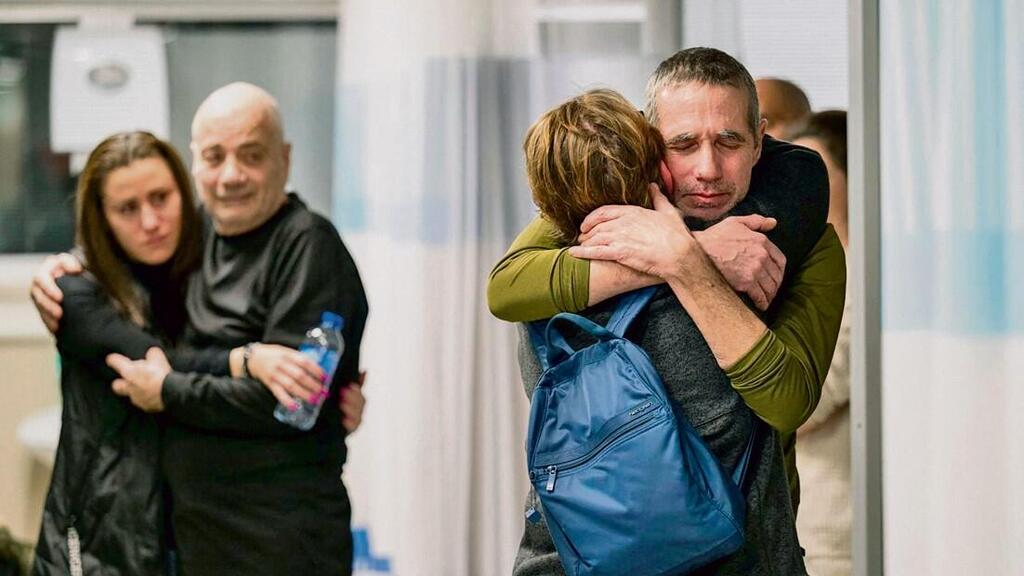Getting your Trinity Audio player ready...
History has taught us often about the harsh conditions suffered by prisoners of war, but nothing compares to the nightmare endured by the Israeli hostages held in Gaza for nearly 8 months, under extremely difficult conditions.
As hard as we tried to get ready for the hostages who were released, nothing prepared us for what they had, in fact, been through. The amount of food they were given and the daily caloric intake, was akin to extreme starvation equal to that of Jews during the Holocaust.
3 View gallery


Crowds in Tel Aviv protest the government's failure to release the hostages held in Gaza for nearly 8 months
(Photo: Dana Kopel )
Thus far there have been two groups released, one of women and children who were held for approximately 50 days and the second of older men who were freed in an IDF operation after 129 days in captivity. We can say definitively that the longer hostages are being held, the worse their condition.
An examination of their nutritional and physical state cannot ignore the circumstances of their abduction and its trauma. Some were kidnapped amid extreme violence, some were witness to the massacre that was unfolding around them, children were often separated from their parents or had witnessed them being hurt. Each journey would have a dramatic effect on the time in captivity.
There is no denying that nutrition and emotional well-being are interconnected. Eating depends on the mental and emotional state. What we have learned is that the hostages had all been through the Hamas tunnels and later held in apartments. Some were alone and others in groups. Some were moved often, and others remained in one place for the duration of their captivity.
Their nutrition also varied and depended on their guard's rank and his ability to obtain food, as well as his willingness to supply it to the captives. Women who were held with their children gave their food to the kids. Older women held mostly alone showed resilience when they confronted their captors in demands for more food. One such woman demanded to receive more than just rice, twice a day, and was able to get a pita bread as well.
Food was provided twice daily at different times, sometimes in the morning and evening hours and, in other cases, the first meal was given only in the afternoon. Meals consisted of rice, half a pita and some preserved cheese. Some hostages were given vegetables early on, but as the war progressed, the amount of food was reduced. Some said they had been reduced to licking their plates in hunger. Women who were held in groups with young men described how they were physically abused and often given no more than two dates for breakfast and half a pita for dinner.
Hostages were given 300 calories a day, causing irreversible damage
Under normal circumstances, women should not eat less than 1,200 calories a day, while men must have at least 1,500 calories. Less then that can cause hormonal damage, as was seen in the testimony of some of the women who said their menstruation stopped during their captivity. Their daily intake was of 300 calories and 10 grams of protein a day and there were cases of punishment when food that was not consumed was given again on the next day or alternatively no food was given at all.
There was no access to clean water at any time, according to the testimony of the hostages who were release. Some were given polluted well water to drink, leading to gastrointestinal problems, diarrhea and vomiting. Sanitation was abysmal with groups of hostages made to share one toilet with no water, causing disease to spread.
3 View gallery


Luis Har and Fernando Simon Marman reunited with their family after their rescue from captivity in Gaza
(Photo: AFP)
Injuries were untreated or treated badly. The body is unable to heal without proper nourishment. It would lack the energy needed to heal wounds and fractures or bolster the immune system, causing every infection or inflammation to require energy that was not available and leading to depletion of the body's reserves, in muscles and bones.
Some of the freed hostages are still undergoing rehabilitation in hospital or community clinics, and may have to continue for an indefinite period of time, because of the individual process of physical and emotional rehabilitation.
Based on the condition of those who were freed, there is real concern for the hostages left behind. Time is of the essence. Many are being held in tunnels, without access to daylight. A prolonged lack of vitamins can cause cognitive problems which may never be resolved.
 Meital Bejamin
Meital Bejamin There are men with existing medical conditions who are not receiving care and may never be able to overcome the problems caused there.
Prolonged starvation could lead to a loss of minerals and to Refeeding Syndrome, which could cause fatal cardiac injury.
But, above all else, over three weeks of starvation can cause death. We want them back now, to begin their rehabilitation as quickly as possible.
Meital Benjamin is a registered dietitian at Sheba Medical Center who treated hostages freed from Hamas captivity in Gaza


